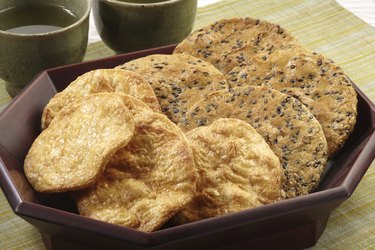
Rice crackers, called sembei in Japan, are among the most common snacks in the Japanese cuisine. The crackers are made with the base ingredients rice, oil and salt, but can come in several flavors such as black sesame. Rice crackers supply small amounts of protein and they're low in fat, which means they can have a place in your healthy eating plan.
Calories, Fat and Other Basics
Video of the Day
A 28-gram serving of Japanese rice crackers, which is equal to about 16 pieces, contains 110 calories and 1 gram of fat. None of the fat in the rice crackers is saturated fat. Limiting how much saturated fat you include in your daily diet is a good way to protect the health of your heart and reduce the risk of stroke. That same serving supplies 2 grams of protein, which is slightly more than 4 percent of the 46 grams women need each day and slightly less than 4 percent of the 56 grams men require on a daily basis.
Video of the Day
Sodium Content
Salt is one of the few ingredients in Japanese rice crackers, and it adds sodium to the snacks. A 16-piece serving of Japanese rice crackers contains 75 milligrams of sodium. That translates to 5 percent of the 1,500 milligrams of sodium you should make as your daily upper limit, as suggested by the American Heart Association. Sticking to this recommendation can help reduce your risk of heart failure, stroke, kidney disease and stomach cancer, notes the AHA.
What's Missing
Japanese rice crackers don't contain any fiber. Women need to include 25 grams of fiber in their daily diet and men should aim for 38 grams each day. Fiber promotes normal digestion, helps prevent constipation and reduces the risk of certain health problems such as heart disease. Japanese rice crackers don't supply key vitamins and minerals such as calcium, iron and vitamins A and C either.
Rice Crackers in Your Diet
Just because Japanese rice crackers don't supply much in the way of vitamins and minerals doesn't mean you can't include them in your healthy eating plan. They are low in fat, which makes them a good snack, but pair them with the right ingredients so you still get the nutrients they lack. Top each cracker with a slice of low-fat cheese to add protein and calcium or lean chicken to add protein and iron. Spread the rice crackers with low-fat cream cheese and top them with mango chunks to add vitamins A and C, as well as potassium. Dip rice crackers into low-sodium bean dip as a healthy way to include fiber in your snack.